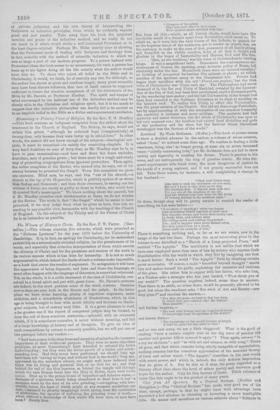The Witness of History to Christ. By the Rev. Ii',
W. Farrar, (Mac- millan.)—This volume contains five sermons, which wore preached as the " Hulsean Lectures" for the year 1870 before the University of Cambridge. It is, in fact, an apology for Christianity, for its antecedent probability as a miraculously-revealed religion, for the genuineness of its words, and especially that orthodox interpretation of them which asserts the divinity of Christ, and for the greatness and success of the work in its various aspects which it has done for humanity. It is not so much argumentative, which indeed the limits of such a volume make impossible, as a book that states the results of argument. To antagonists it will have the appearance of being dogmatic, and hero and there the language, as must often happen with the language of theorator, is somewhat vehement. Yet, on the whole, it is a noble statement of the case of Christianity, con- ceived in a broad spirit and put with great force. Mr. Farrar's sermons are indeed, in the most genuine sense of the word, orations. Orations now-a-days are rare both in the Senate and the pulpit. In the latter plane we have some learning, plenty of ingenious argument, acute criticism, and a remarkable abundance of illustrations, which in tide ago is being brought to boar with much felicity and freedom on theolo- gical subjects, but of oratory very little. It is a great pleasure to read, a far greater one if the report of competent judges may be treated, to hear tho roll of those sonorous sentences,—splendid with an ornament which, if it is sometimes excessive, is never without meaning, and full of a large knowledge of history and of thoughts. To give an idea of such oompositions by extract is scarcely possible, but we will put one or two passages before our readers :— " And horn comes in the true force and moaning of miracles, the immense importance of their evidential purpose. They worn no mere objectless prodigies, no more thaumaturgic feats intended to astound the feeble understanding ; but they were the divine proofs of a tender and conde- scending love. Had they never boon performed, we should long ago have been left 'having no hope, and without God in the world ;' long ago, oppressed by the unbroken silence, we might well have believed that there was no living and personal God, or no God for us ; and that behind the vail of the blue heavens, as behind the tomplo vail through which the rash Roman burst into the Holy of Holies, there wore vacua omnia. Shut up in the prison-house of imperfect and delusive sense,— denizens of a universe, which being abandoned to dead laws is but ' a machine worn by the dust of its own grinding,'—struggling with irre- sistible forces, the least of which might at any moment annihilate our race,—haunted by ghastly imaginings which spring from the certainties of misfortune, the agonies of suffering' the grinning irony of death — what, without a knowledge of God, would life have been, or man have beon ? Surely then
" 'Dragons of the prima That taro oach other in their slime
Winn mellow music matched with him.'
But from all this—which, as all history shows, would have been the inevitable result of a Science apart from Revelation—God saved us. To, admit us, as it were,-into the very bosom of the Infinite, to quench for us the hopeless terror of the unknown, not to render us abject, but, on the contrary, to make us the eons of God, possessors of all that is strong and beautiful in the visible creation, heirs of all that is bright and glorious in the hopes of Immortality and Heaven, God sent His Son.
'Sirs, ye are brethren,' was the voice of Christendom to warring Icings. It was a magnificent faith. Henceforth the contemptuous ex- clusiveness of Greece, the cunning, cruel, tortuous policy of Rome, fell absolutely under the ban. Henceforth there were no natural enemies ;' no trotting of conquered barbarians like animals or plants ; no selfish sacrifice of the ignorant many to the illuminated few. Priests had begun their sacrifices with the cry Procul este profani,' but the true voice of Christianity was 'Como unto me.' Tho Philosophers had never dreamed of it, but the real Unity of Mankind, revealed by the Imam- • tion of the Son of God, had been first proclaimed, amid a thousand perils, by the wandering tent-maker ; and the full Universality of the Gospel had
been first revealed to the Galilroan fisherman as he slept at noonday on
the tanner's roof. To realize this Unity, to effect this Universality, was the great mission of the Church. She did not discourage Patriotism, but by supplementing it with the conception of our common humanity she rendered it intenser and more sublime. The ancients had had mytories and secret doctrines, but tho whole of Christianity was open to her very meanest son ; the heathen had adored local divinities and gods of the profession and the class, but the Saviour whom Christians worshipped was the Saviour of the world."


































 Previous page
Previous page